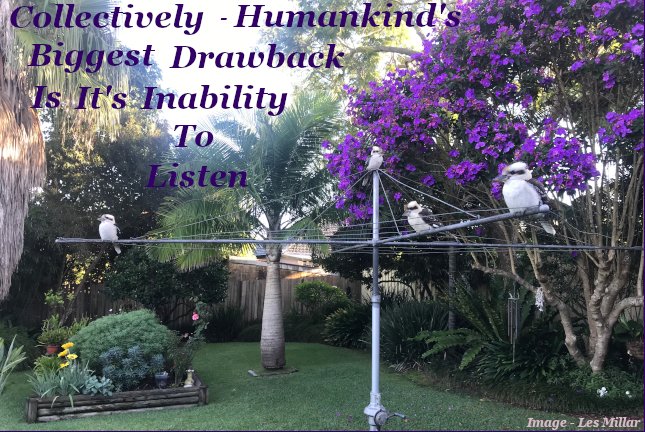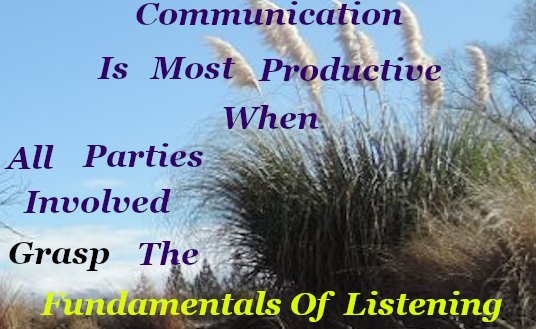Fundamentals Of Listening
Guidelines To Improving Listening Skills
The fundamentals of listening are guidelines to improving listening skills, presented here in no particular order because listening skills are equally important. Having made that claim however, being a good communicator begins with a desire to understand.
The best way to approach listening fundamentals, is to reacquaint one’s self with practicing the familiar, and work towards the less familiar, until an integrated big picture is conceived.
When you conclude these guidelines are all part of the one entity, you are well on the way to becoming a competent listener.
Fundamentals Of Listening
- Make listening easy - By deciding that you are going to take a genuine interest in what the speaker has to say. It may sound twaddle and often is, but to the speaker it is important. One can learn amazing things from benign situations. At the very least your ability to listen attentively will make a friend - and possibly, an ally.

The context a communication takes place in is a great indication of the response required. A working knowledge of the different types of listening comes to our aid here.
- Arguing is for fools – This age old advice will be forever true. No-one wins an argument. At best, the dominant party will suffer serious resentment. At worst, violence ensues with resultant damage to limb, property, and life. It can be a tough call to quit arguing. Eastern Sage Confucius admitted he was sixty years of age before he learned not to argue.
Being one of the most abused fundamentals of listening, it is reasonable to reckon the earlier one learns not to argue, the sooner one's relationships will improve.
- Intelligent discussion achieves positive results - Reciprocal listening is the one and only way to resolve disputes. Even if one is ‘Right’ within the law, let alone a mundane situation, a ‘win’ can leave simmering resentment to ferment and explode when least expected.
- Listening makes the speaker feel valued - You know yourself how you feel when someone has actually understood and fed your thoughts and feelings back to you in terms that you, in return, have understood that they did in fact understand what you were saying.
That’s deep. That’s communicating. That is what listening is all about.
- Hearing is not listening – Unless the listener can replicate the above passage, he or she is merely hearing words. Communication can be easy - and Joyful - when one truly masters the fundamentals of listening.

- Listening is essential to learning – Learning is about comprehension, not merely memory. An individual must stretch their mind to understand.
- Repetition is essential to learning – Rarely do we ‘get it’ completely the first time round. Even the ‘simple’ stuff.
Few people will object to questions being asked by a listener inspired by a genuine desire to learn what the speaker wishes to communicate.
- Listening is an art in addition to being a skill – the two are mutually inclusive. While the Laws of Nature dictate consequences, learning how to apply these Laws comes with dedicated practice. For instance, knowing when it is okay to interrupt. As with all skills, experience is the best teacher.
- Your capability to listen affects your relationships as well as your ability to learn – these two are also mutually inclusive. Every individual involved with an undeveloped listener, is affected detrimentally. The situation matters not.
- To learn effectively whilst listening – a comprehensive vocabulary is not merely an advantage, it is essential. The power of words will never diminish.
- Assumption is rarely a sound basis - For interpreting what a speaker means. Only the speaker knows that, and listening is the means of comprehending, often taking much time, much discussion and much patience.
It is worth remembering that to assume makes an Ass out of U and Me.
- Sometimes - quite often actually - Another person simply wants an empathetic ear to grasp and acknowledge their version of affairs. During these times, an encouraging word, a nod, and gentle eye contact is all that is required. Once they feel they have been understood, they will be more receptive to your version of affairs or opinions. Interruptions are unnecessary and counter-productive.
Relationships always benefit from this type of listening, rapport is established and can be built upon.
- Interrupting is about asking questions – This, and the previous fundamental are not in conflict with each other. What are your options - Asking appropriate questions at appropriate times indicates your interest in the other person. Silence can also demonstrate a lack of interest. Any questions asked should focus on more information to enable a better understanding.
Experience in the art of listening teaches one when it is okay to interrupt.
- Advice is not always welcome - Even when specifically asked for, advice should be offered with much caution. The best approach is to express confidence in the others persons ability to solve their problem, and offer a heartfelt “You will find a way”.
- Effective listening demands energy expenditure - In the form of concentration – Doing so requires suspension of our analytical process, our tendency to be judgmental, and the tendency to simply goof off into our own private world.

The inability to focus on what another is saying, is perhaps the greatest barrier to Improving listening skills. Threatening the establishing of mutual understanding and trust. Otherwise known as that wonderful, yet often elusive relationship builder – Rapport.
- Listening requires one’s full attention - Improving listening skills begin with taking a genuine interest in what the speaker is saying. There can be no doubt that doing so can be both stressful and demanding.
It helps to recall that we are developing a habit, and that habits become automatic. Building Good Habits via the fundamentals of listening is well worth the initial effort. Good habits pay dividends for a lifetime.
Developing good listening habits, is to relationships, as is understanding ingredients, is to a wizard Chef.
- Communication is a two way street - Akin to every element of Personal Development, listening works like a charm when reciprocated.
We Are Communicating Anyway
Whether we are consciously aware of it or not, we are constantly communicating. Rightly or wrongly, others are absorbing our verbal and behavioral signals, and making judgments about us. As we are about them.
This being the case, is it not better to impress others by ever being on our best behavior?
Practicing the fundamentals of listening goes a long way to achieving this desirable state.
Fundamentals Of Listening Rock!
Next - Types Of Listening





